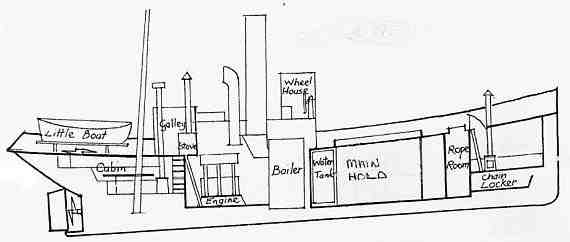Great Yarmouth History
Life on Board Ship - Home from Home?
The life on board a drifter was tough, make no mistake about that. Probably the worst aspect was the weather. Imagine working on a slippery, rolling deck, at night during an autumnal squall. This prospect immediately makes you glad you have a job on shore. A ship, with a full load of herring was always in danger of going down in bad weather. So the skill and knowledge of the skipper was paramount. The driftermen had to live with the constant danger of being washed overboard and the heavy oilskins they wore could either keep them afloat or send them plummeting to the depths like a stone. It was all a matter of luck.
The hours were long and arduous as there was no rest whilst there were fish to be caught. When steam drifters were introduced the hazards on board increased considerably. Much of the machinery used was unguarded so it was easy to lose a few fingers. When acetylene lighting was introduced the safe storage of the calcium carbide fuel was essential, because if this became contaminated with water it would explode. The medical provision on board was no better than the first aid kit in your car. If somebody was seriously injured then the skipper could return to port with the resulting loss of earnings for all on board. However usually, it meant the injured just had to wait until a hold full of fish sent the ship homeward bound. There was limited fresh water on board, just enough for drinking water for the crew and drinking water for the boilers. There was none for washing, this water would be taken from the sea. You've guessed it, no toilet provision at all, so they had to make do.

Starboard cutaway view of Drifter

Plan cutaway view of Drifter
There was a lack of material comforts on board the drifters. However you have to bear in mind that this was in the days when most houses never had bathrooms or inside toilets. Heating would have been from a stove in the kitchen, with no heating at all upstairs. Back to the ships. The food on board ship was always very good. The owners came to realise that to do this job the "fires inside had to be well stoked" and they were.
Most skippers had an allowance, from the share, to bestow on anybody as he saw fit. Most skippers used the money to pay for a decent cook. A good cook made sure there was an adequate supply of good food at all times for the men. Since most fishing trips only lasted two nights the driftermen were never away from home for too long.